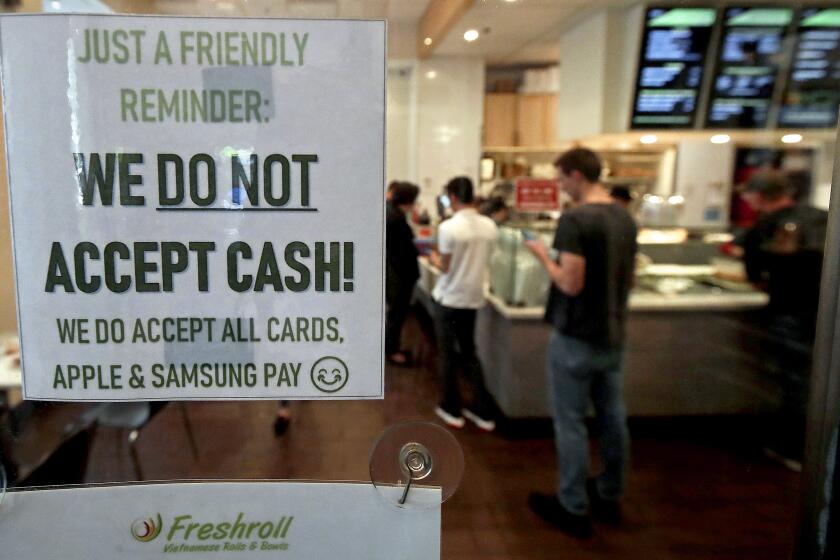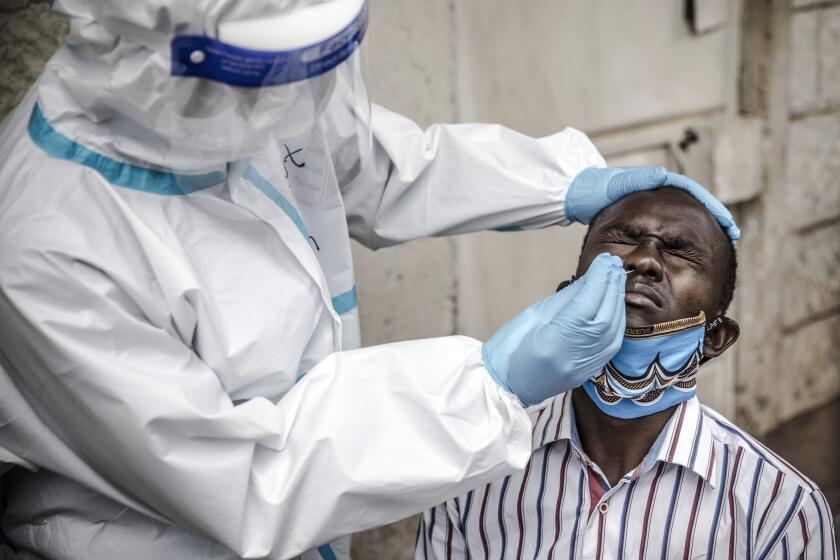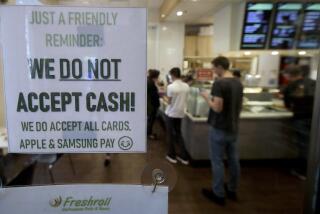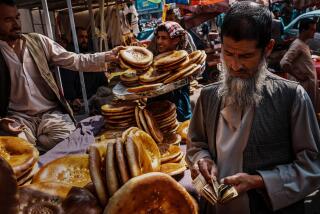No cash, please, we’re skittish: How coronavirus has spawned fear of paper money
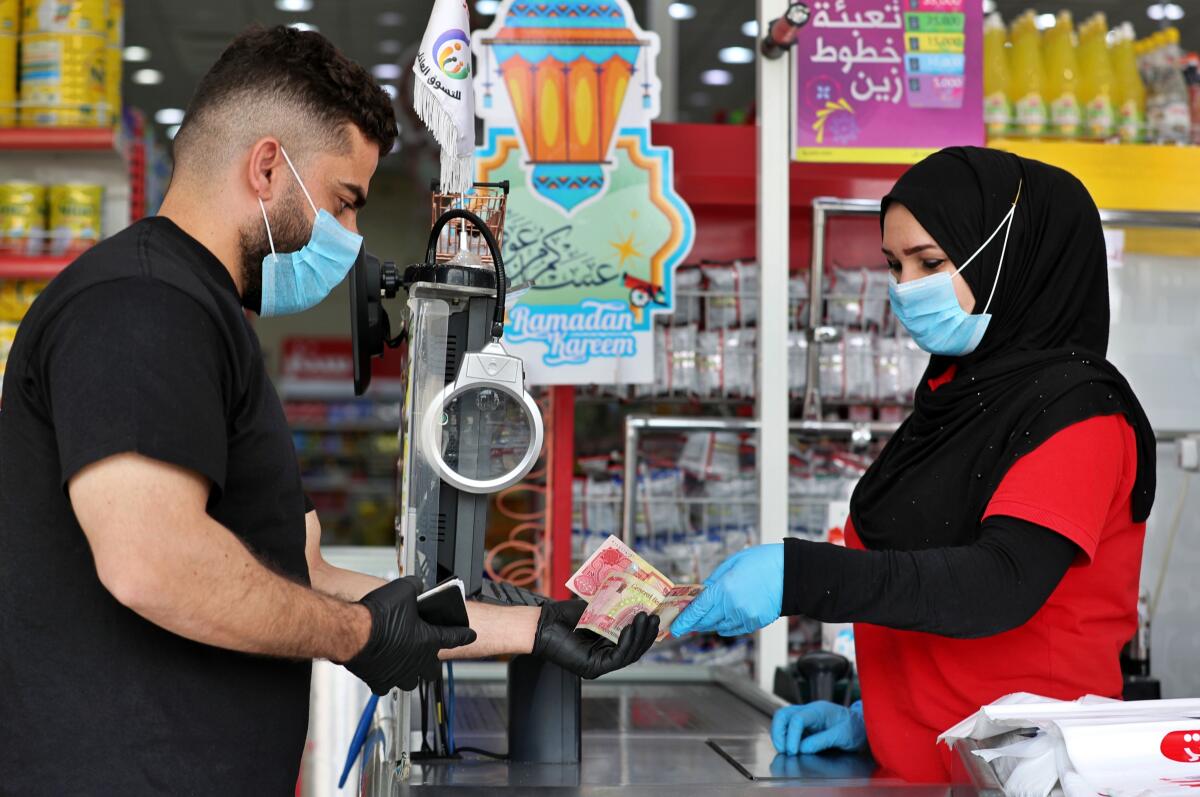
- Share via
In troubled times, people have been known to hoard currency at home — a financial security blanket against deep uncertainty.
But in the coronavirus crisis, things are different. This time cash, passed from person to person like the virus itself, is a source of suspicion rather than reassurance.
No longer a thing to be shoved mindlessly into a pocket, tucked into a worn wallet or thrown casually on a kitchen counter, paper money has seen its status change during the virus era — perhaps irrevocably. The pandemic has also reawakened the debate about the continued viability of what has been the lifeblood of global economies: physical bank notes and coins.
From the supermarkets of the U.S. and Japan to the shantytowns of Africa to the gas stations of Tehran, a growing number of businesses and individuals worldwide have stopped using cash for fear that physical currency, handled by tens of thousands of people over their useful life, could be a vector for the spreading coronavirus.
Public officials and health experts have said that the risk of transferring the virus from person to person through the use of money is minimal.
Still, in the midst of the coronavirus era, a thousand calculations are made before cash is handled — mostly with gloved hands. Some leave the money laid out on surfaces for days, for the virus to die. Others disinfect bank notes with spray. Some even microwave them in the belief that it kills the virus. In China, banks are now required to sterilize cash with ultraviolet light or heat.
Fear of paper dollars is now palpable in parts of the United States with coronavirus cases.
“In many areas, cash was already beginning to disappear due to the increased risk of robbery, the ease of internet ordering and the ubiquity of cellphones,” says Zachary Cohle, an assistant professor at the department of economics at Quinnipiac University in Connecticut.
“Cash,” Cohle says, “now carries an extra stigma.”
But is ditching cash altogether even feasible? Humans have a centuries-old emotional relationship with physical money that is difficult to erase.
“Currency represents value that we can hold in our hands. Cash provides a way for us to translate a day’s work into something tangible and easily traded,” Cohle says.
You know you need to wash your hands after going to the grocery store — what about your favorite hoodie? Here’s what we know so far.
“Cash ist Fesch” is a common saying in Austria and southern Germany. The phrase, which literally means “cash is beautiful,” reflects an attachment to cold hard cash — and not just among the older generation or those who worry about the loss of privacy that comes with cashless payments.
“I always pay with cash, as a matter of principle,” Ingel Strobl, a 76-year-old pensioner, said while shopping at a bakery in central Vienna. “I don’t want that we lose our right to our own money. You know what I mean.”
For some among the younger generation, paying with cash is also a status symbol.
Since the virus outbreak, however, shops that have remained open have posted signs encouraging people to pay with cards. Many are: According to Germany’s central bank, 43% of people have changed their payment behavior in the past few weeks; now, a large percentage are likely to make contactless payments with a card.
Japan, for all its sophisticated reputation, is also a solid believer in cash. But the threat of the coronavirus could be the impetus the nation needed to move toward cashless payments.
“The culture is slowly changing,” says Hiroki Maruyama, who heads the Fintech Assn. of Japan, a nonprofit organization.
Billionaire investor Warren Buffett says that “cash combined with courage in a crisis is priceless.” And in crisis-hit countries and parts of the world gripped by conflict or inflation, cash is still carried in thick wads for simple shopping expeditions.
In Lebanon, as the economic situation deteriorated late last year and the fear of banks collapsing mounted, many people began saving cash in their homes. and the sale of home safes surged.
As banks imposed capital controls, trips to the bank to withdraw foreign currency — followed by a trip to one of the ubiquitous exchange shops to change money on the black market — became the norm.
“I wear gloves. But honestly? Corona is the last thing on people’s minds right now,” said a money changer in Beirut who asked to be identified by his first name, Ihsan, fearing unwanted attention from authorities.
Cash still rules in many other parts of the Middle East, as well as West and Central Africa. Monthly banking account fees are prohibitive for many, and the self-employed often keep their savings at home in hard currency. In parts of Africa, ATMs often don’t work.
Many countries saw the coronavirus as a ‘rich man’s disease’ imported by overseas travelers. It has since hit marginalized groups the hardest.
Dorothy Harpool, a director and lecturer at Wichita State University’s W. Frank Barton School of Business, predicts that the pandemic would lead some consumers to rethink their use of cash. But going completely cashless, she said, is a long way off.
“Until everyone and every country has reliable access to the internet, I do not believe the pandemic will singularly change past practices,” Harpool said. In particular, cash transactions are also likely to remain the norm for businesses operating under the radar of government and other regulatory bodies.
Ihsan, the Beirut money changer, said there are certain things you just can’t do without cash.
“Like how else can you bribe a government employee to get your business done?” he asked. “With a credit card?”
More to Read
Sign up for Essential California
The most important California stories and recommendations in your inbox every morning.
You may occasionally receive promotional content from the Los Angeles Times.
